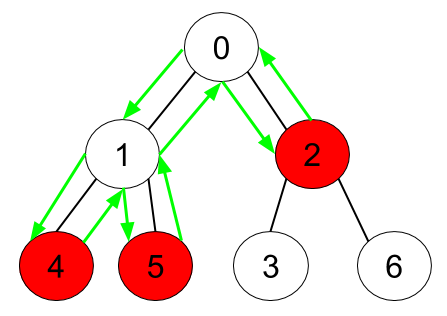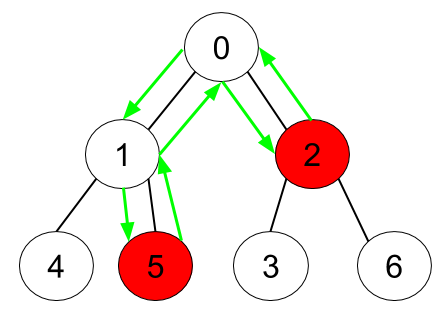1443. Minimum Time to Collect All Apples in a Tree


Description
Given an undirected tree consisting of n vertices numbered from 0 to n-1, which has some apples in their vertices. You spend 1 second to walk over one edge of the tree. Return the minimum time in seconds you have to spend to collect all apples in the tree, starting at vertex 0 and coming back to this vertex.
The edges of the undirected tree are given in the array edges, where edges[i] = [ai, bi] means that exists an edge connecting the vertices ai and bi. Additionally, there is a boolean array hasApple, where hasApple[i] = true means that vertex i has an apple; otherwise, it does not have any apple.
Example 1:

Input: n = 7, edges = [[0,1],[0,2],[1,4],[1,5],[2,3],[2,6]], hasApple = [false,false,true,false,true,true,false] Output: 8 Explanation: The figure above represents the given tree where red vertices have an apple. One optimal path to collect all apples is shown by the green arrows.
Example 2:

Input: n = 7, edges = [[0,1],[0,2],[1,4],[1,5],[2,3],[2,6]], hasApple = [false,false,true,false,false,true,false] Output: 6 Explanation: The figure above represents the given tree where red vertices have an apple. One optimal path to collect all apples is shown by the green arrows.
Example 3:
Input: n = 7, edges = [[0,1],[0,2],[1,4],[1,5],[2,3],[2,6]], hasApple = [false,false,false,false,false,false,false] Output: 0
Constraints:
1 <= n <= 105edges.length == n - 1edges[i].length == 20 <= ai < bi <= n - 1fromi < toihasApple.length == n
Solution
minimum-time-to-collect-all-apples-in-a-tree.py
class Solution:
def minTime(self, n: int, edges: List[List[int]], hasApple: List[bool]) -> int:
graph = defaultdict(list)
for a, b in edges:
graph[a].append(b)
graph[b].append(a)
def go(node, prev):
val = 2 if hasApple[node] else 0
for nei in graph[node]:
if prev != nei:
val += go(nei, node)
return 2 + val if not hasApple[node] and val > 0 else val
return max(0, go(0, -1) - 2)